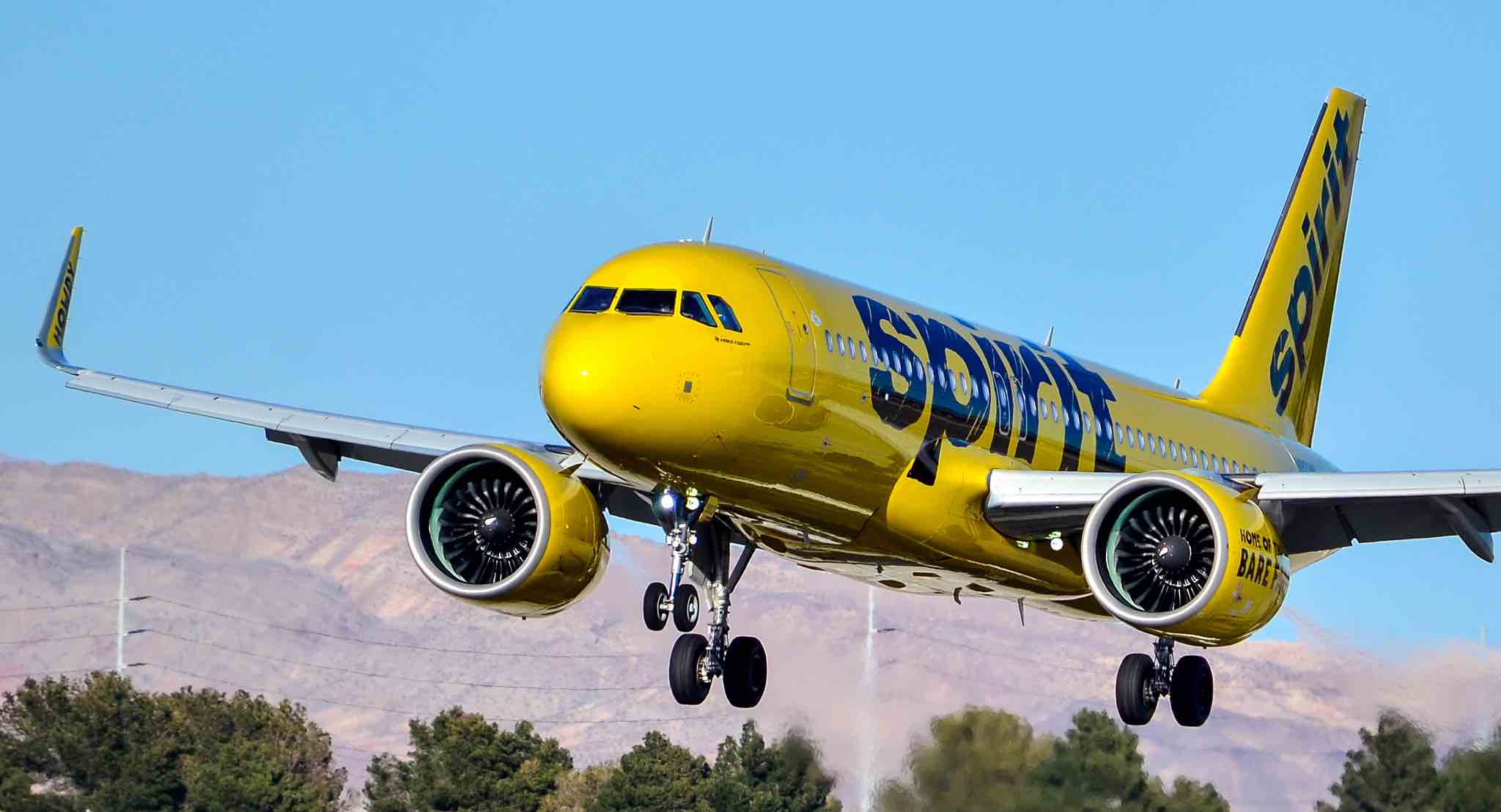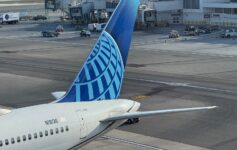
Still fuming over the blocked merger between JetBlue and Spirit Airlines, Spirit Airlines CEO Ted Christie III fumed that the US airline industry is a “rigged game.” He’s right.
Spirit Airlines CEO: “US Airline Industry Is A “Rigged Game” And “American Consumers Are The Long-Term Losers”
Christie is still upset that the merger that would have brought JetBlue and Spirit together in hopes of creating a more viable competitor to The Big Four (American Airlines, Delta Air Lines, Southwest Airlines, and United Airlines) was blocked by a US federal judge (using quite spurious legal reasoning). He’s upset that the US Department of Justice (DOJ) initiated the lawsuit and that its metrics for gauging whether a merger would be helpful to consumers or competition. The result, per Christie, is that consumers are “the long-term losers.”
“Today, nearly all the profits of the entire U.S. airline industry are concentrated in just two companies, while the smaller non-legacy carriers scrambled to restore profitability in what seems ever more like a rigged game. The Big Four are the beneficiaries in this new normal. American consumers are the long-term losers.”
While that is a bit too simplistic (his objection does not answer, for example, why are Delta and United doing so much better than American), I do not disagree with his fundamental contention that by blocking the merger, customers will lose and the system does feel rigged.
He went on to attack both the federal court and the DOJ:
“We still feel strongly it was a serious misreading of both the evidence and the law for the federal court to enjoin our merger with JetBlue. And aside from the waste of taxpayer funds and the damage done to two proud companies through this process, the fact that DOJ even brought a case to block a merger between two carriers with less than 8% combined market share just shows how uninformed the government is about our dynamic airline business, particularly in the post-COVID era.”
Quite right and the issue about the two carriers’ combined market share is an important factor in showing that this was not like the mega-mergers of the last decade.
Christie also correctly pointed out that carriers have been able to take advantage of credit cards and the t “If you strip away what appears to be a very lucrative transatlantic market and the credit card–based revenue of the loyalty programs of the bigger airlines, if you take those things out, they’re losing money.”
That’s a bit of an oversimplification and nothing is to stop Spirit Airlines from introducing a more lucrative loyalty program or transatlantic service.
Yes, The Airline Industry Is Rigged
I am quite sympathetic to Christie’s complaints and perhaps the clearest evidence of the industry being rigged was the massive bailouts of airlines and airline workers during the pandemic.
Want to know why United continues to devalue its frequent flyer redemptions? Becuase it is sitting comfortably after being bailed out by the US taxpayer three times during the pandemic. Why do airlines squat on slots and try to legislate competition like JSX out of business? Because of government regulations that tend to favor incumbent carriers.
Government regulation is not inherently the problem, but the system itself is stacked against carriers like Spirit and JetBlue and I do agree with Christie that consumers are the true losers as a result.
Here’s an interesting perspective from Scott Galloway, a professor at the New York University Stern School of Business. His words are needlessly crude so I would label it unsafe for work, but his point about letting businesses fail is quite thought-provoking, especially to me as a young(er) person:
CONClUSION
Spirit CEO Ted Christie is still upset that the merger between Spirit and JetBlue was blocked and that network carriers like United and Delta are enjoying healthy profits while his carrier struggles for survival. He’s not wrong…there’s a lot of imbalance in the system that was only exacerbated by the US bailing out airlines during the pandemic and not requiring them to pay back the money.
image: Spirit




One reason why consumers are “long-term losers” are the greed of all airlines in charging too much for everything .
Hello … anyone home ?
@Matthew, My memory is not the best, but weren’t you initially against the merger?
Also, my business skills aren’t the best (I am a physician, we are as a group notoriously bad business people)
So, I, a complete lay person always saw Spirit/Frontier as making more sense and a more competitive company than Spirit/JetBlue.
I was against it personally, but I felt the legal justification to block it was quite weak.
I do think a Frontier – Spirit merger could create a more robust ULCC in the USA and would welcome that.
“That’s a bit of an oversimplification and nothing is to stop Spirit Airlines from introducing a more lucrative loyalty program or transatlantic service.”
LOL!!!!
How easy has it been for JetBlue to start up transatlantic service?
What were their legal bills for ONE AMS turn?
You’re a smart guy, Matthew, so you should know better than to make a statement like that.
But doesn’t the point remain that, at least in theory, there is nothing stopping Spirit from improving its loyalty program or offering transatlantic service? Of course, it can’t start operating overnight, but if it feels that is the way to profitability, there is a path forward.
The merger was going to remove seats from NK planes and thus reduce capacity and increase fares. I disagree with the DOJ striking it down, but I am unsure they could enforce B6 to keep the ULCC model.
I don’t think any of the mega legacy mergers did anything like that. B6/NK needed to frame this as more pro-consumer than they did. They fought an uphill battle against a DOJ looking to strike this down and didn’t get the assignment right.
Consumers will be more worse off if one or both airlines fail than if they combined (consumers would still be worse off, but less worse than if one fails).
The reason DL and UA are doing so much better than AA, is that they have never lost focus on their customers. AA on the other hand has adopted a policy of providing LCC service while still charging full service fares. It’s all down o Doug Parker and his ilk, which systematically destroyed US Air and the AA.
Never lost focus on their customers? What? They devalue loyalty incessantly. They don’t care at all about customers. None of them do. They care about shareholders.
I think there’s an argument to be made that service on Spirit is better than any of the legacy carriers; they just offer fewer amenities. Spirit FAs seem like they actually want to serve you drinks, though of course you’re paying for them.
Agree. Why is Delta and United doing much better than AA? One word Parker. Parker was the worst CEO and should have been fired years ago! I hope American can again return to the great airline it once was.
Government F’s the consumer, nothing new here.
Maybe try again if a new administration with a different business philosophy wins in November.
Look at any serious regional air market: USA, EU, Southeast Asia, India, Mexico*. You have legacy carriers propped up by governments, and LCCs that more or less thrive by offering great point to point networks and very low fares. easyJet, Air Asia, VivaAerobus, Lionair all do really well and are more or less pleasant to fly.
If Spirit can’t carve out a niche in the US, then that’s a management problem. $50 fares are normal, or even high in all those other markets, but even for Spirit that’s low. You’re usually paying 2x to 4x more. The problem isn’t that the system is rigged (though it is). Spirit needs to do something different.
*I exclude Brazil because they don’t really have a legacy carrier.
The only thing rigged is his business model. Abusing customers and employees alike is hardly a long term business plan. Treating people right is part of any sucessful business plan. they left that one on the cutting room floot.
They problem is Spirit. They’ve already burned through anyone who would try them and come back for a second time. Sure they’ll keep the $40 Greyhound but those people have no choice. They HAVE to fly Spirit. Serious consumers won’t even consider them.
When you offer a product as unreliable and as bad as Spirit, you become a “one and done” type business.
Government regulation, or lack thereof, is indeed the problem. It was the lack of regulation which has led to the domination of the ‘Big 4′ carriers in the first place and the collusive oligopoly such as you have in the USA is never in the consumers’ interest.
Small TYPO in the beginning of the 6th paragraph:
“…take advantage of credit cards and the t “If you strip …”
We are like prisoners on board. Sad that we don’t yet have any high-speed trains in America.